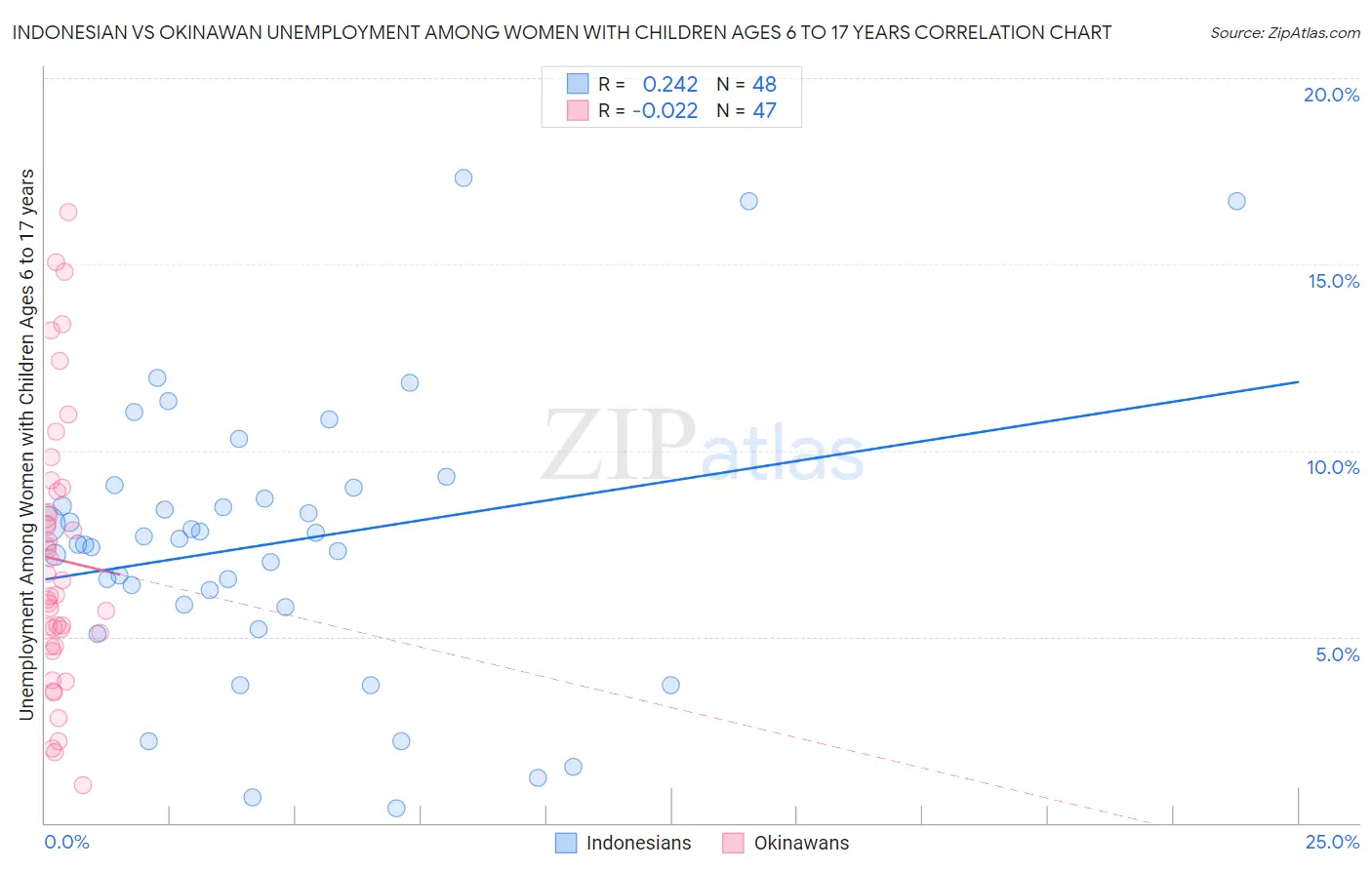Indonesian vs Okinawan Unemployment Among Women with Children Ages 6 to 17 years
COMPARE
Indonesian
Okinawan
Unemployment Among Women with Children Ages 6 to 17 years
Unemployment Among Women with Children Ages 6 to 17 years Comparison
Indonesians
Okinawans
7.4%
UNEMPLOYMENT AMONG WOMEN WITH CHILDREN AGES 6 TO 17 YEARS
100.0/ 100
METRIC RATING
13th/ 347
METRIC RANK
7.0%
UNEMPLOYMENT AMONG WOMEN WITH CHILDREN AGES 6 TO 17 YEARS
100.0/ 100
METRIC RATING
5th/ 347
METRIC RANK
Indonesian vs Okinawan Unemployment Among Women with Children Ages 6 to 17 years Correlation Chart
The statistical analysis conducted on geographies consisting of 136,569,357 people shows a weak positive correlation between the proportion of Indonesians and unemployment rate among women with children between the ages 6 and 17 in the United States with a correlation coefficient (R) of 0.242 and weighted average of 7.4%. Similarly, the statistical analysis conducted on geographies consisting of 65,822,820 people shows no correlation between the proportion of Okinawans and unemployment rate among women with children between the ages 6 and 17 in the United States with a correlation coefficient (R) of -0.022 and weighted average of 7.0%, a difference of 5.1%.

Unemployment Among Women with Children Ages 6 to 17 years Correlation Summary
| Measurement | Indonesian | Okinawan |
| Minimum | 0.40% | 1.0% |
| Maximum | 17.3% | 16.4% |
| Range | 16.9% | 15.4% |
| Mean | 7.5% | 7.1% |
| Median | 7.6% | 6.1% |
| Interquartile 25% (IQ1) | 5.8% | 4.8% |
| Interquartile 75% (IQ3) | 8.9% | 8.9% |
| Interquartile Range (IQR) | 3.0% | 4.1% |
| Standard Deviation (Sample) | 3.7% | 3.6% |
| Standard Deviation (Population) | 3.7% | 3.5% |
Demographics Similar to Indonesians and Okinawans by Unemployment Among Women with Children Ages 6 to 17 years
In terms of unemployment among women with children ages 6 to 17 years, the demographic groups most similar to Indonesians are Sudanese (7.4%, a difference of 0.040%), Bangladeshi (7.4%, a difference of 0.71%), Immigrants from Taiwan (7.3%, a difference of 1.0%), Puget Sound Salish (7.5%, a difference of 1.1%), and Immigrants from Burma/Myanmar (7.5%, a difference of 1.5%). Similarly, the demographic groups most similar to Okinawans are Tlingit-Haida (7.1%, a difference of 0.47%), Soviet Union (7.1%, a difference of 0.53%), Ute (7.0%, a difference of 0.60%), Immigrants from Hong Kong (7.2%, a difference of 2.0%), and Assyrian/Chaldean/Syriac (7.2%, a difference of 2.3%).
| Demographics | Rating | Rank | Unemployment Among Women with Children Ages 6 to 17 years |
| Taiwanese | 100.0 /100 | #1 | Exceptional 6.5% |
| Fijians | 100.0 /100 | #2 | Exceptional 6.6% |
| Tongans | 100.0 /100 | #3 | Exceptional 6.7% |
| Ute | 100.0 /100 | #4 | Exceptional 7.0% |
| Okinawans | 100.0 /100 | #5 | Exceptional 7.0% |
| Tlingit-Haida | 100.0 /100 | #6 | Exceptional 7.1% |
| Soviet Union | 100.0 /100 | #7 | Exceptional 7.1% |
| Immigrants | Hong Kong | 100.0 /100 | #8 | Exceptional 7.2% |
| Assyrians/Chaldeans/Syriacs | 100.0 /100 | #9 | Exceptional 7.2% |
| Immigrants | Fiji | 100.0 /100 | #10 | Exceptional 7.3% |
| Immigrants | Taiwan | 100.0 /100 | #11 | Exceptional 7.3% |
| Bangladeshis | 100.0 /100 | #12 | Exceptional 7.4% |
| Indonesians | 100.0 /100 | #13 | Exceptional 7.4% |
| Sudanese | 100.0 /100 | #14 | Exceptional 7.4% |
| Puget Sound Salish | 100.0 /100 | #15 | Exceptional 7.5% |
| Immigrants | Burma/Myanmar | 100.0 /100 | #16 | Exceptional 7.5% |
| Cambodians | 100.0 /100 | #17 | Exceptional 7.5% |
| Afghans | 100.0 /100 | #18 | Exceptional 7.6% |
| Filipinos | 100.0 /100 | #19 | Exceptional 7.6% |
| Immigrants | Singapore | 100.0 /100 | #20 | Exceptional 7.7% |